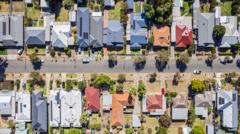The People's Action Party is expected to secure another term in Singapore's general election, but the focus is on the electoral margins as opposition support grows in response to economic challenges.
Singapore's Election: Polling Margins Take Center Stage as Discontent Grows

Singapore's Election: Polling Margins Take Center Stage as Discontent Grows
The upcoming general election in Singapore will test the ruling People's Action Party amid rising public dissatisfaction over living costs and governance.
As Singapore approaches its general election, the political landscape is shifting, with heightened attention on the margin of victory rather than solely on the anticipated victor. The ruling People’s Action Party (P.A.P.), which has maintained a stronghold on power since 1959, is expected to win. However, significant discontent regarding its policies, particularly in relation to the escalating cost of living, has ignited support for opposition parties, chiefly the Workers' Party.
Five years ago, when the nation last held elections, the P.A.P. effectively positioned itself as the steady hand leading the country through the turmoil caused by the coronavirus pandemic. This time, the narrative remains consistent, underscored by global economic uncertainties and the ramifications of ongoing U.S.-China trade tensions. Political analysts acknowledge an increasing dissatisfaction among voters, which culminated in the P.A.P. experiencing its second-lowest electoral performance in 2020, even though it still secured a majority.
The Workers’ Party, led by Pritam Singh, has captured the public’s attention with robust rallies, indicative of a growing appetite for a more competitive political environment in Singapore. Singh has advocated for a balanced political system, emphasizing that a voice of opposition is necessary for democratic engagement. “We must be active participants in our democracy,” he stated, reaffirming the principle of a checks-and-balances government.
This election could serve as a barometer for change, especially since Prime Minister Lawrence Wong took over leadership last year following the lengthy administration of Lee Hsien Loong. While Wong has reiterated the P.A.P.'s proven past of delivering stability and prosperity, his government faces a crucial test of acceptability among the populace. With opposition support on the rise, the election results will reveal the electorate's true stance on the government’s handling of current challenges and their vision for Singapore’s future. As campaigning intensifies, voter turnout will be critical in determining whether the P.A.P. can maintain its dominance or if a shift toward a more balanced political representation is on the horizon.





















